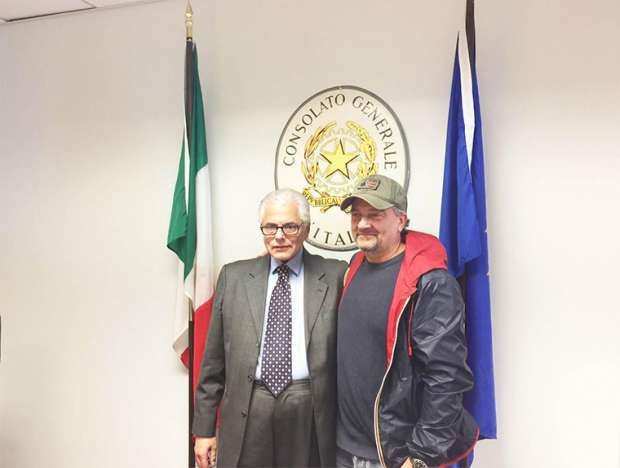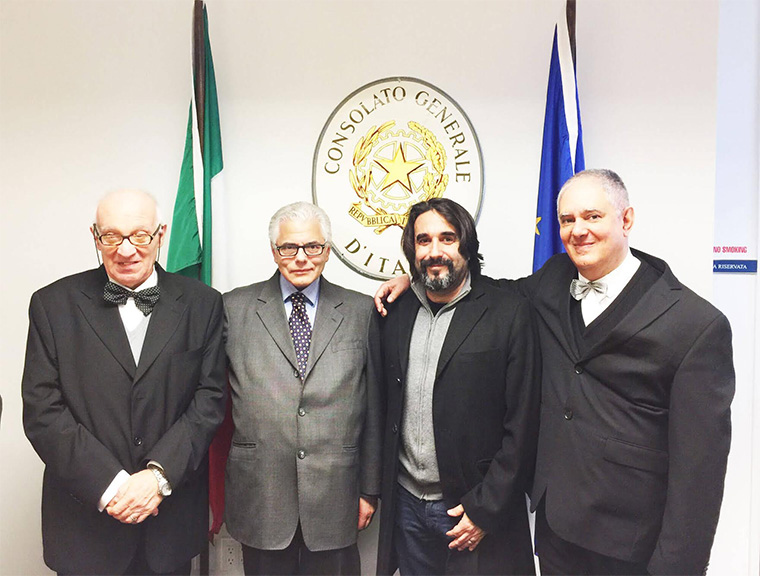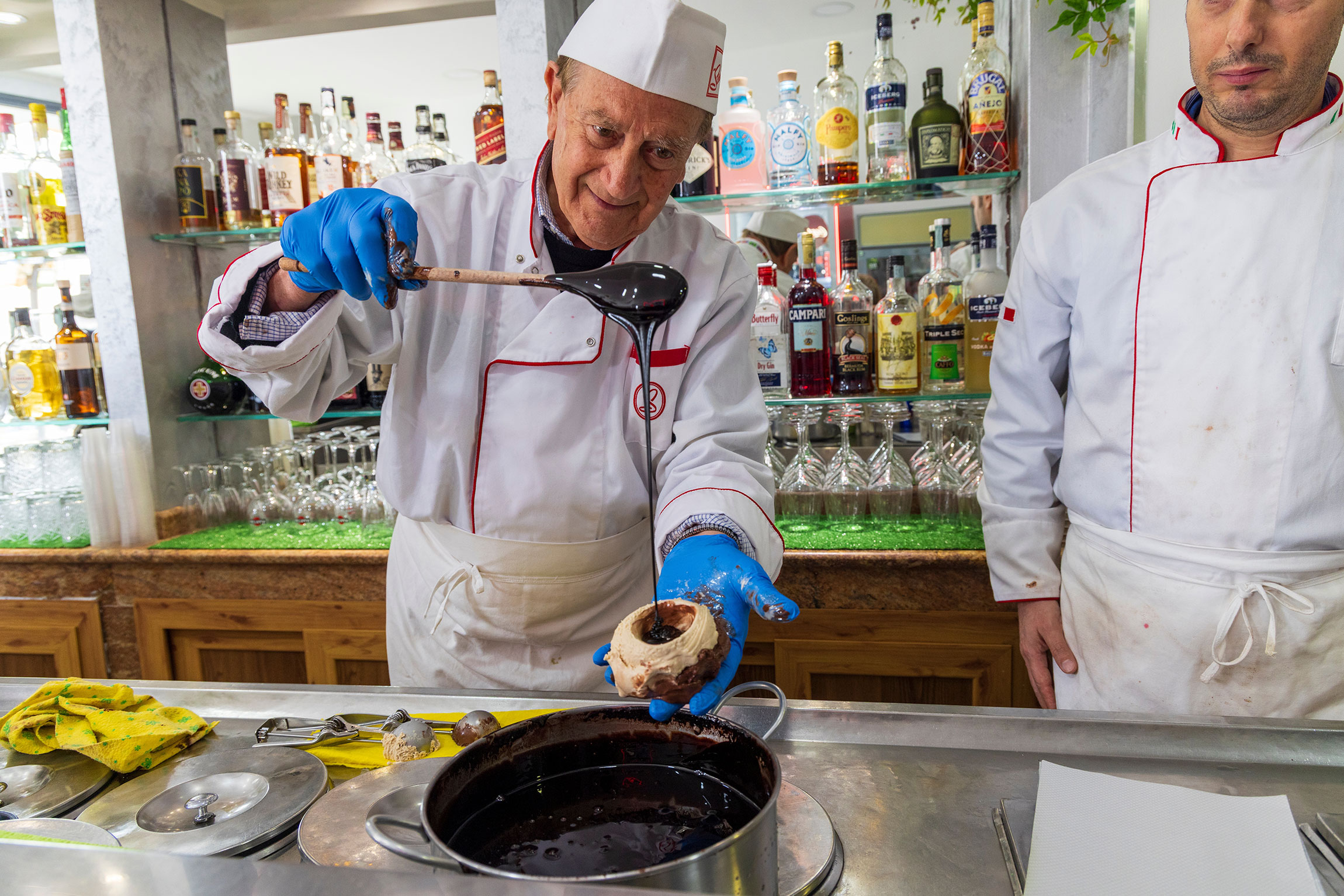Alongside “Los Angeles Italia Film Fashion and Art Fest”, a meeting was held at the Italian Consulate of Los Angeles between the Consul General Antonio Verde and the filmmakers who showcased their films to the American public. The event, now reaching its twelfth edition, is one of the most important Italian cinematographic engagements held abroad and it is no coincidence that the famous TCL Chinese Theatre on the Walk of Fame of Los Angeles was the selected location. The dates are no accident either. In fact, the event, which has a packed program every day, lasts a week and paves the way to the night of the Oscars, ending on the day before the delivery of the statues. Forty-eight films are shown in total and among them are the most recent masterpieces such as Gianfranco Rosi’s “Fuocoammare” and Giovanni Veronesi’s “Non è un Paese per giovani”, the latter having its world premiere right here in Los Angeles. In this twelfth edition, special attention goes out to Gianfranco Rosi’s film not only for his Oscar nomination but for having brought forth the theme of immigration in its most tragic and raw form, at such a crucial moment in the United States.

Consul General Antonio Verde with Giovanni Veronesi
Consul, how important is it to make our talents and our historic cinematographic traditions known to Los Angeles, the cradle of the world of the cinema?
Bringing forth our talents and, above all, receiving positive feedback on behalf of the American public which is fittingly considered the capital of the cinema and of entertainment, is extremely important, not only from a strictly commercial point of view, but also as a means of promotion of our country. Movies are an extremely strong instrument of diffusion of a certain image that does not necessarily always have to be a positive or softened one, but it can be an image that is critical, problematic, and in line with our times. The fact of expressing a critical issue or a problem that you acknowledge as a reality is a strong factor for a democratic country since it is from the awareness of such crisis that it is likely to yield solutions. Although, cinema is also a vehicle of diffusion of all positive things that make our country great among all the great countries of the world.

Consul General Antonio Verde with Fabrizio Maria Cortese and the actors from “Opera Don Guanella” rehabilitation center in Rome
With Giovanni Veronesi and Gianfranco Rosi’s films, we see a dramatic and upsetting split in our country. In your opinion, how long will it take for an Italian film to be the center of the Oscars, portraying a lighter, more carefree Italy?
There are already many films that represent Italy in a positive light, or ones that do not give Italy only a negative image. Veronesi’s film is a cross section on adolescence, which is traditionally problematic. In adolescent years, you are always searching, even in an idealistic way, for a better world of dreams, and rightfully so. It is the age of growth, of the refusal of hierarchy, pre-established orders, and the search for something new, better, which the characters of the movie search for in Cuba, but instead finding the positive and negative sides of the reality that surrounds them, like everywhere else. Is the grass always greener on the other side? Most likely not and it is usually us who are the ones with the “greener grass”. I do not see the desire to go abroad as a negative aspect, but one of enrichment.
Rosi’s film shows the difficulties linked to a complex international scenario in which Italy confirms itself as a welcoming and generous country. Since our country has recognized emigration, it is also able to understand the new emigration, to assure assistance, and to save human lives as well as to give first aid to persons that have lost everything. The image of Rosi’s film, besides the drama of the situation that it evokes, is an image of a country the responds to these external difficulties and contributes by being a voice of hope to the many people that find themselves in these extremely difficult situations.
Regarding the situation of immigrants, do you think Europe should help countries, like Italy, who are strongly involved, with greater efforts?
From the Italian standpoint, there is a request of international solidarity with regard to their European partners, solidarity that has come and that can certainly be improved. The question of immigration is not a problem tied solely to one country but of a global entity to which responses on a global level are certainly expected, making European solidarity very important to us, something that we appreciate and that we value while we do our part to make it more efficient.
Gianfranco Rosi’s “Fuocoammare” unfortunately did not win however Alessandro Bertolazzi and Giorgio Gregorini won the Oscar for hairstyling and makeup for the movie “Suicide Squad”. Your comments?
Aside from what the final result has been, I have beed extremely pleased with Rosi’s documentary as it drew the attention of a remarkably vast audience, such as that of the Oscars, to a serious and real problem which is not typical of one country alone, but rather a global concern.
As far as Oscar winners Bertolazzi and Gregorini, it is a remarkable achievement since Italy had not won an Oscar in this field in 30 years.






























